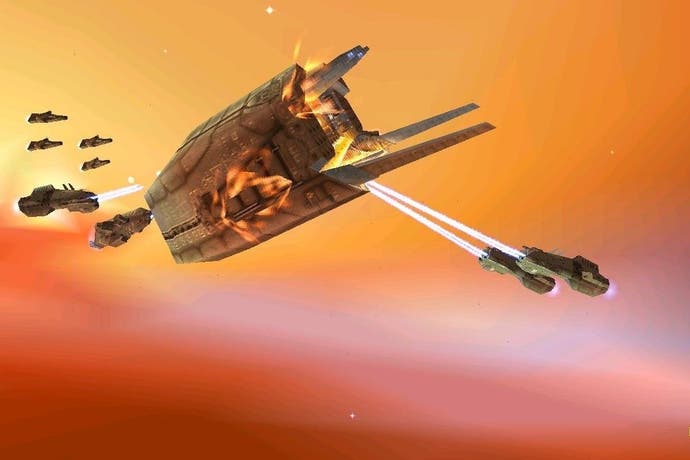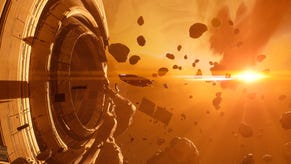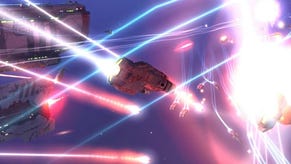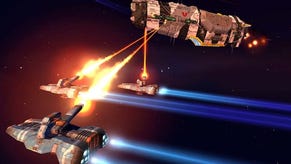There's no place like Homeworld
From the archive: It's full of stars.
Editor's note: This retrospective was originally published in September 2010, and we're returning to it this weekend to celebrate the imminent release of Homeworld: Remastered, which is due on PC next week.
There are games that we love to play and then there are games that we love to... well, just love. Above all others Homeworld has established a place in my heart that will likely only ever be relinquished should its achievements become the norm rather than the rare exception in gaming.
Released in 1999, it tells the story of the people of Kharak, an isolated planet at the far edges of the galaxy. Upon the discovery of a relic buried deep underground, they come to learn that they are in fact exiles on their planet. For over 60 years, the population unites and devotes itself to building a starship capable of carrying them home. You enter the game as this Mothership prepares to make its maiden test flight.
You could write an entire article about the further intricacies of Homeworld's story alone - unlikely alliances, the voyage of self-discovery - but it would only tell half the story of the game's success, and for those who haven't yet experienced it, the journey is one that should remain Relic's prerogative to tell.
What propels Homeworld into the stratosphere though is the meticulous design, polish and deployment of everything else to enhance that storytelling. It's greater than the sum of its parts, and these combined efforts set the game apart not only from its genre contemporaries but gaming as a whole.
Take your units. Returning from your first hyperspace test-jump to discover you've unknowingly breached an ancient treaty banning your people from interstellar travel, units are transformed into real, emotionally vulnerable people. We've become so accustomed and even numbed to cigar-chomping marines vowing to kick whatever clichéd ass might be called for that the brief and plaintive commentaries from your Homeworld units under fire become almost heartbreaking.
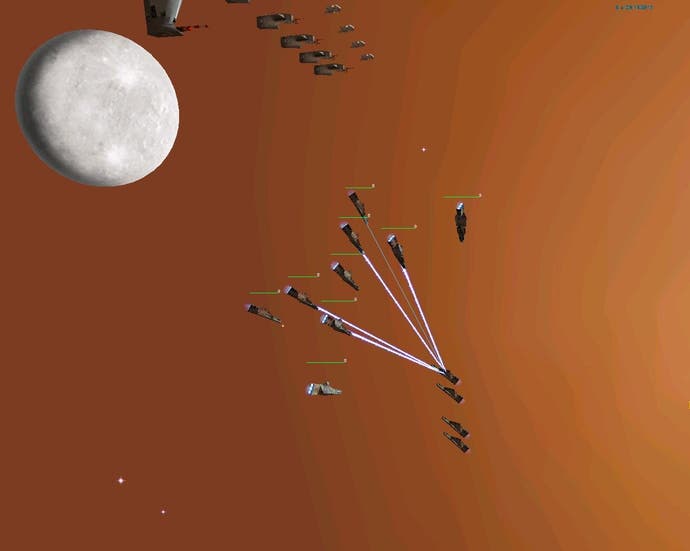
With your planet destroyed in retribution, all that remains now above Kharak is the Mothership and half a dozen cryogenic chambers containing the remnants of your population. The game becomes a race against death to secure whatever chambers can be salvaged as they're picked off one by one, a hundred thousand lives at a time.
The original mission having collapsed, your military commanders now speak with cracked voices and hollow shock. The game becomes a journey not through a series of maps, meeting arbitrary objectives along the way, but towards survival itself.
Never mind that you can save and reload freely at any point should you find yourself overwhelmed or under-resourced. Such is your emotional investment in the struggle of these people that, when that first opportunity to begin the long road towards revenge presents itself, getting it right and delivering justice at the first attempt is an imperative rather than an option. Alert, upright and with nerves on fire, you gain the same thousand-yard stare that you sense in your pilots. This matters.
A great part of this skilfully directed emotional play is the music. Where 2001: A Space Odyssey relied on Also Sprach Zarathustra for its showpiece, a choral recording of Samuel Barber's Adagio for Strings is the overriding theme for Homeworld.
Its most notable appearance is in the opening scenes as you prepare to undergo that fateful hyperspace jump. With the camera panning back from the Mothership, units flowing from the hold and spraying engine trails across the sky, the music builds along with the relentless winding up of the engines - it's a shot of valium to the heart and settles you into the world with a deep mental sigh. In moments of danger, the soundtrack moves from a delicate ambient background track sprinkled with piano motifs to a more tribal, urgent call to arms. It works every time.
While the raw textures and activity within the game engine were impressive for their time, what keeps Homeworld timelessly immersive is its approach to style over fidelity. If 2001 set the stage for grand space opera in film, Homeworld might be said to have done the same for a sort of space ballet in gaming.
Fighter ships move gracefully into a series of formations without micro-management. Resource harvesters twist and writhe through space in order to dock in perfect geometric synchronisation with the Mothership. While you concern yourself with the bigger strategic picture, everything else falls together like over-amorous stickle-bricks. Future space games like EVE Online were smart to follow suit, sacrificing realism on the altar of grace where necessary.
This gentle approach extends to the post-mission cut-scenes, which are delivered not with bombastic, CGI extravagance but lightly animated monochrome concept drawings, a styling that adds a sense of gravitas. They serve to suggest that this is the retelling of a grand historical story, one in which you were the key to its success or failure.
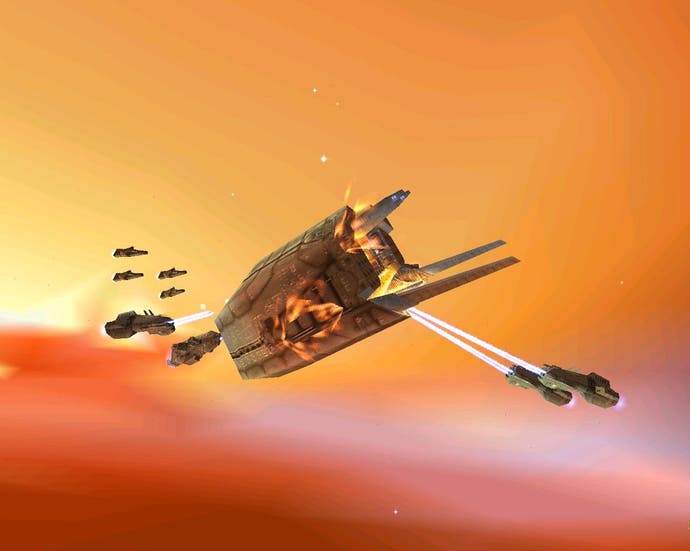
Alongside the hypnotic single-player campaign there was an enormous multiplayer following. Sadly I was late to the internet and had to put up with occasional LAN skirmishes whenever I could persuade my then housemates to switch Warcraft off for a while. I enjoyed these other sessions but, while I liked Warcraft, I was always thinking of Homeworld, and wish I had been around for its internet heyday.
Homeworld isn't without minor flaws. Even by the standards of its time, the interface and unit selection mechanics are a fiddly affair, at least until units are placed into hotkey groups. Likewise, such a bold transition from the familiar, top-down RTS viewpoint into 3D was always going to be problematic in a genre where accuracy and control are so critical.
It was a topic of debate that occupied the game's enthusiastic followers throughout development. Having established a path along the horizontal plane, accommodating for height requires a certain degree of cross-checking and refinement. Without careful camera control and practice it's entirely possibly to send your units in a different direction to that intended.
But Relic was finding its feet every bit as much as its audience, and what difficulties remain are easily forgiven in the broader context of something so bold and enthralling. Rather than its control mechanics, Homeworld will instead be remembered for its storytelling achievements and unrivalled sense of immersion.
